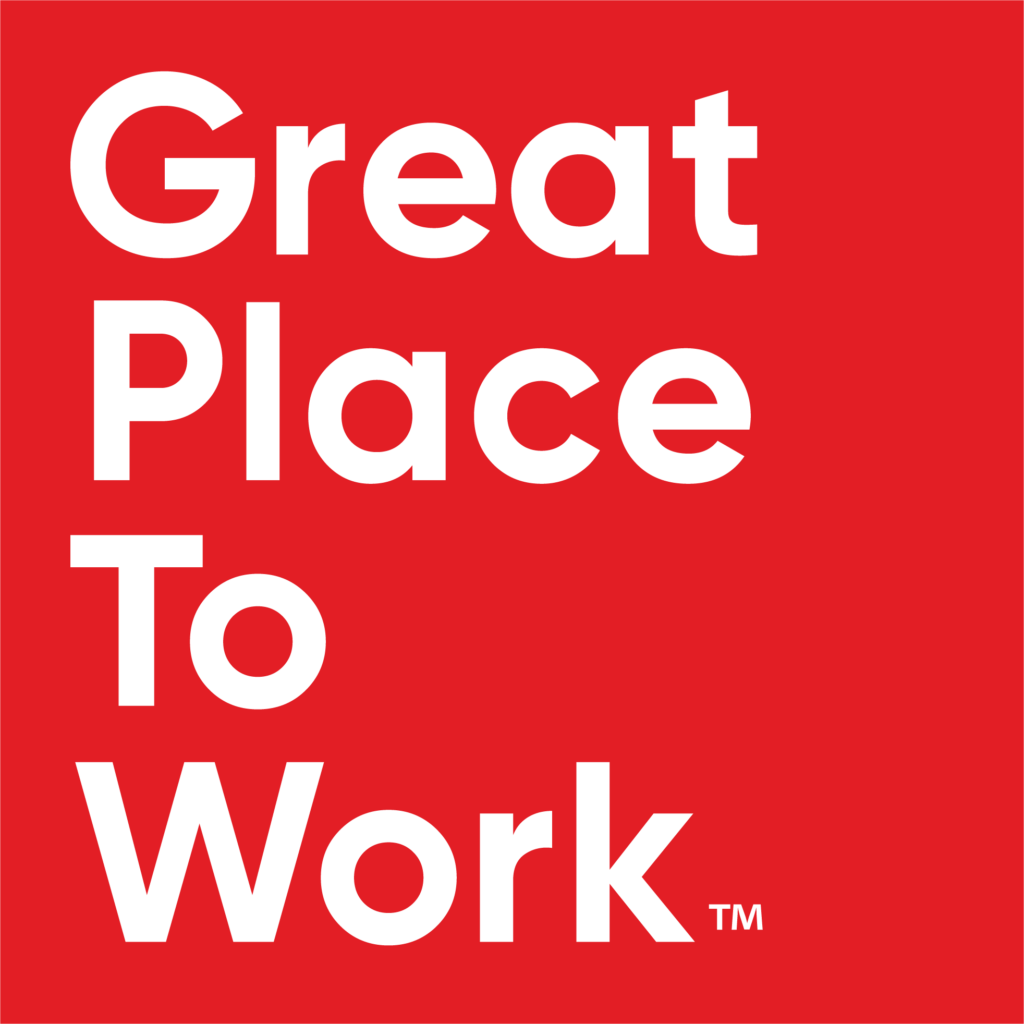Image: Employees at Camden Property Trust, this year’s number 8 on the 100 Best Companies to Work For® list.
The 2021 Fortune 100 Best Companies to Work For® is like no other year. As we struggled through what is likely to be the biggest crisis in our lifetime, these companies leveled up.
Their leaders took care of their employees and their communities in ways that may surprise you. Because of their leader’s incredible empathy and generosity, employees reported a better experience compared to pre-pandemic times.
Key highlights of this year’s list:
- Over half a million confidential employee surveys determine the 100 Best Companies to Work For in the U.S.
- 71% of winning workplaces scored better on employee experience than in pre-pandemic times
- Even industries hit hardest by the pandemic improved employee trust thanks to exceptional care and leadership
- Black employees’ experience soared when their company took a meaningful and consistent stand against racial injustice
- Generous community giving, impacting millions, was a standout feature of the 100 Best
- Benefits and compensation in 2020-21 went far beyond the standard to support all employees
Based on confidential employee surveys gathered during the pandemic, amid this period of upheaval, workplaces that put employee health first – both physical and psychological – enjoyed record jumps in employee experience scores.
Seventy-one percent of companies on this year’s list saw an increase in their scores from last year, increasing on average by 3 percentage points.
“These companies stood out for heroic efforts to care for their employees, their customers and our society, in a difficult year,” said Michael C. Bush, CEO of Great Place to Work. “Remarkably, our research found that employee experience scores rose at these workplaces overall – a testament to the resilience of their inclusive, high-trust cultures.”
Companies whose employee trust scores rose during the pandemic are characterized by widespread faith in colleagues and their leaders. Seventy-two percent of employees at winning companies have confidence in executive teams.
Our analysis revealed strong links between positive employee opinions and how employees witnessed their senior leaders and direct managers during the crises of last year.
Companies went above and beyond to support employees with unique benefits and compensation
Some key distinguishing features of this year’s list were generous community giving efforts, and leaders showing exceptional care and a clear vision for the future.
This year, employee benefits and compensation also went above and beyond, including extra PTO, providing backup childcare, and hazard pay for frontline workers. Coming in at number 4, the grocery chain Wegmans embodies these features.

Wegmans compensated their staff with:
- Employee appreciation budgets
- New COVID disability paid leave to protect income during quarantine or positive diagnosis
- Job-protected voluntary leave to secure positions for employees uncomfortable working on the frontlines.
The company also re-trained and redeployed thousands of “non-essential” Wegmans employees so these people could continue working instead of being let go.
Employee experience reached record highs in industries hit hardest by COVID-19
The findings of the employee survey also reveal that so-called pandemic-proof business models, such as information technology, do not determine which company cultures thrive through crises. More accurately, it is widespread faith in leaders and shared purpose.
Many companies on the list are in industries squeezed severely by the pandemic. For example, Texas Health Resources, a hospital in Arlington, Texas, is number 7 on the list and global hotel chain, Hilton, took position number 3.
Widespread faith in leaders and shared purpose help company cultures thrive through crises.
Companies such as Texas Health stood out for how they connected their employees to a sense of purpose. Employees could connect what they were doing at work to what was happening outside in the broader community. Texas Health, a hospital at the brink of the health care catastrophe, had 87% of employees saying it’s a great place to work amid the pandemic.
Barclay Berdan, CEO of Texas Health had been moved seeing how the people he leads went above and beyond during a once-in-a-lifetime crisis. “It’s not really just a job. For many, if not most, it’s a calling,” said Barclay. “I get choked up almost every day.”

At Hilton where the occupancy rate plunged 80% and the company was forced to furlough many of its staff, an impressive 96% of employees say it’s a great place to work.
The evidence indicates that employees at Hilton trusted their senior leaders and direct managers to have the vision, the compassion and the competence to lead their business through the crises of 2020.
Corporate social responsibility separated the 100 Best from others
Another key feature of this year’s list is the generous donations of time, company resources and funds to social justice and COVID-19 related relief efforts.
Camden Property Trust, which owns and manages 165 apartment communities across the country, set up a rent deferral program and a website for their tenants to apply for grants of up to $2,000. This wasn’t the only act of generosity that employees witnessed of Camden’s executive vice chairman of the board, D. Keith Oden and CEO and president, Ric Campo.
“We just figured we needed to do something and do something in a big way,” Ric said. The number 8 company, Camden put $10.4 million into the fund – including $1 million directly from Ric’s and Keith’s pockets.
“It’s who we are,” Ric says. “It’s an investment in our customers, in our people, and in our brand.”
In the wake of the murder of George Floyd, the mutual insurance company Nationwide – number 25 on the list – committed $1 million to social justice organizations including the NAACP Legal Defense Fund and the Equal Justice Initiative. They also contributed $1 million to the National Fair Housing Alliance.
And in response to requests from employees, Nationwide also changed its program for matching employee donations to charities. It widened the pool of eligible matching grants to include organizations focused directly on social justice.
Employees place a higher value on two-way communication and leadership integrity
Through the uncertainty of 2020, employees also paid particular attention to how well their leaders kept them informed about a world – and a workplace – in a constant state of flux. Survey questions that measured leadership communication on important issues and change improved 3% from the previous year.
In survey questions that probed employees’ perceptions of management, the top 100 companies saw a 5- to 6-point increase on measures of two-way communication, integrity and competence – key leadership qualities for leading through a crisis.
Overall confidence in executive teams increased for winning companies. On average, 72% of employees at winning companies have confidence in their executive teams, up 6% from in 2020.
The top 100 companies saw a 5- to 6-point increase on measures of two-way communication, integrity and competence – key leadership qualities for leading through a crisis.
Atlantic Health System, number 67 on the list, is based in New Jersey, has been at the heart of the health crisis. Atlantic SVP, chief human resources officer, Nikki Sumpter, said the company bolstered their two-way communication during the pandemic, including regular pulsing with the Great Place to Work Trust Index survey.
“Our recipe for success includes measuring the performance of our culture programs and adding a cup of two-way communication – that is really important,” said Nikki. “By listening to our team members and hearing their needs, we can make sure our response meets them where they are. The Trust Index survey has been a valuable resource,” said Nikki.
Nationwide enjoyed an astonishing climb in employee scores. In addition to its financial contributions to the problems of 2020, Nationwide stepped up by holding a “unity day” for employee conversations about racial injustice and instituting a program to bring in civil rights speakers.
Amid all these efforts, the experience of Black employees at Nationwide improved markedly in 2020. Trust Index scores for Black employees rose 9 percentage points, such that 92% of Black employees now say it’s a great place to work.
For comparison, at the average U.S. workplace, just 49% of employees across demographic groups say theirs is a great place to work. Nationwide’s Black employee scores on the question of whether “my work has special meaning” rose a remarkable 16 points, to 90%.
Join the 100 Best Companies
Is your company going above and beyond for all its people? In 2021, 30% of the list is made up of first-timers – companies that made it because of how they were caring through crisis.
You too can apply to get on a Best Workplaces list. Sign up for our company culture newsletter for more examples of best practices from Best Workplaces.
How Great Place to Work determines the 100 Best Companies to Work For
To determine the 2021 list, Great Place to Work surveyed over half a million employees on issues such as how trustworthy, caring and fair the company is in times of crises; employees’ physical, emotional and financial health; and the company’s broader community impact.
Particular attention was paid to how employees’ experiences varied depending on their job role, gender, race/ethnicity, payroll status, and other characteristics to ensure that the company is creating a great workplace For All™.
This year, 60% of each company’s score is based on confidential employee feedback. The remaining 40% is based on the programs each company said they created to support their people and communities in response to the pandemic. This methodology represents a change in response to the unique circumstances of 2020.







